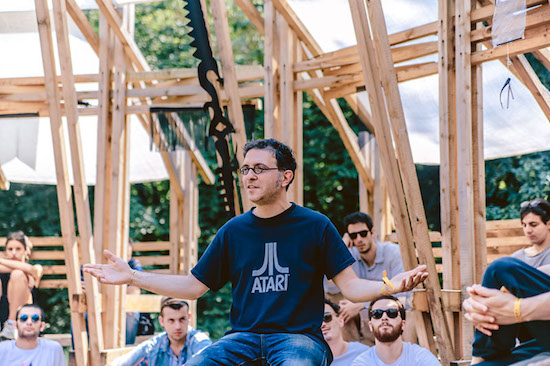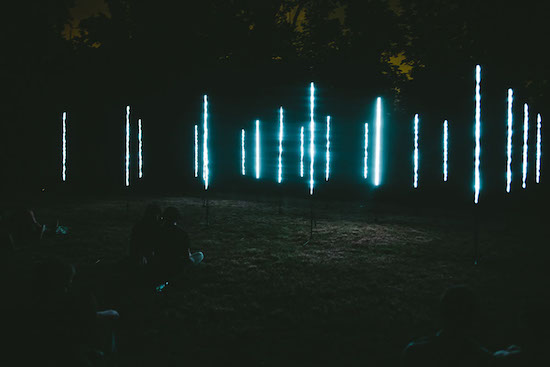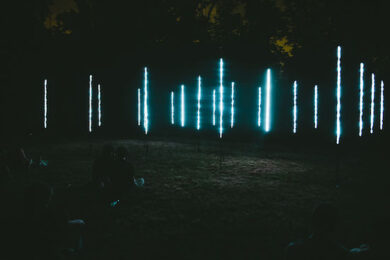But, perhaps less heroically, it’s also special because it has a future. Terraforma is a young festival, only three years old, and has far more ahead of it than it does behind it – room to grow if it chooses, to improve, and to truly come into its own as a festival. In some respects, there’s a lot for Terraforma to learn (about timekeeping, about pricing within its walls) but there’s also a lot for other festivals to take away from this wise younger sibling, from its sustainable approach to waste management to diversification without a hint of tokenism.
With performances this year from Helena Hauff, Charlemagne Palestine, Beatrice Dillon and Rabih Beaini and Vincent Moon, in a few years time, Terraforma could well be the European festival for electronic and esoteric music, where people come to dance and to decompress – to get a sense of just what incredible music sits just outside of their particular bubble.
At this year’s edition, we also took a few things away from the experience.
Charlemagne Palestine is as close to a perfect festival opener as you get.
When you’re as allergic as I am to mosquito bites, it can be hard to concentrate – hard to close your eyes and picture anything but those already-itching joints ballooning to a monstrous size at some point over the next few hours. Charlemagne Palestine, though, is captivating to the point where it doesn’t even matter that my hand is already bigger than my face. There’s a kind of tender eccentricity to his piano playing that seems both to bely logic and simultaneously weave such a dense mythology of its own that logic, order of any kind, is utterly irrelevant to the process of listening.
Palestine barely even seems to touch the keys so much as they appear to press back against fingers that reach out to them knowingly. There’s a mutual understanding between man and percussive machine that in any setting would be beautiful, but as the sun sets behind the stone walls of Villa Arcanti, verges on mystical.
Conversation is key.
Like most swords, this one has two edges: one of them, however, is notably sharper, swifter, brighter, and probably cleaner, than the other. Festivals caught on some years ago to the idea that people wanted more than just overpriced, poorly-flavoured corn on the cob in between dancing: Sonár, for example, has a fantastic programme of workshops to temper the heat. Terraforma, though, manages to bridge the gap of communality that excels during the musical moments of the best festivals but so often falters when it comes to the more esoteric elements. The “talks” at Terraforma are the closest of any I’ve participated in to actual conversation. I may not have been the one engaging directly in conversation with Donato Dozzy or Adrian Sherwood – but I may as well have been in terms of the kind of inclusiveness that proximity necessitates.
Terraforma has a lot of space to work with, and could so easily pack out the huge swathes of empty spaces to host hyper-impersonal lectures by its artists, aimed at rather than taken with their audience. But it doesn’t, and even if the result is never quite enlightenment or revelation, it feels much more like you’re part of something bigger – or smaller.

The other side of the conversation coin (and I know it was a sword just a moment ago) is that there just isn’t enough communication: sets are delayed – often by hours – and even moved to a different stage without any kind of notice. Being relaxed is all well and good – in fact, we’ll get onto that in just a moment – but being so ultra-chill that no one actually seems to know what’s going on creates exactly the kind of anxiety that Terraforma does so well to avoid in all other respects. For example…
Rain can stop play.
It’s a hysterically fucking British thing to say, but – honestly – shit weather is shit and at festivals shit weather is even shitter. It’s raining, and oh shit there’s lightning going off!, what are you going to do at something like Field Day other than buy a single beer with all your money and pray you don’t die watching Anna Meredith? It’s all part and parcel of the general Terraforma vibe – louche, communal, sunblazed an eventually sunburned – and perhaps it’s unfair to set bigger festivals to the same standards (though, really, shouldn’t the goal always be the best possible experience for ticketholders?), but maybe the answer is to just give it a rest for a bit.
It’s 7pm on a Saturday and there’s rain like going through windscreen after windscreen after windscreen at 70mph: know when you’re beaten, call it off for a couple of hours. Put a notice on Twitter and ride it out without the gritted teeth. Stiff Upper Lip syndrome just isn’t a thing here at Terraforma, and when the rain abates the mood is as high as it’s been all weekend. Sometimes surrender is the most effective action. And speaking of surrender…
Helena Hauff never fails to deliver.
Helena Hauff is one of the most exciting DJs in the world right now, and when she starts her set late in the evening at Terraforma it’s the second time I’ve had the pleasure of her sonic company in the last few weeks – the first being her back-to-back set with Ben UFO at Sonár. What sets Hauff apart from other DJs is not only the quality of the records that she plays – as a DJ that seems painfully obvious – but the fine line they tread: as my colleague Luke Turner rightly explains, “the dour intonations throughout bely just how this is about the most fun you could have with your clothes on.” The set sits on a knife-edge between stern, pneumatic pummeling and a kind of low-key drollery that calls on Strauss (and Nietzsche by proxy) to poke fun at its own seriousness.
The result is euphoric beyond its surface tension: never quite clear enough whether the correct response is to smile, to dance, or watch intently from the sidelines I decide the only sensible thing to do is to give in and go wherever Helena decides to take me at any given moment.
It’s possible to re-enact scenes from Spring Breakers in a Milanese villa .
When I leave Luton airport on Friday, there are certain scenes I’m not expecting to see over the course of the next three days. (Although, in fairness, it’s Luton airport and it’s impossible to imagine a future beyond the blunt knives of Frankie & Benny’s and the Absolute Top Lads.) The reimagining of Harmony Korine’s 2012, Skrillex-soundtracked cinematic experience, Spring Beakers is one of them. And yet here we are, on a Sunday no less, and Beatrice Dillon has replaced Sonny Moore at the helm of what, in every sense other than the sand itself, appears to be a properly ripping beach party. Not only are people dancing – and it’s impossible not to want to dance to the kind of infectious dubbed-out techno that Dillon cranks out – they’ve stripped down to their swimwear and are dousing themselves in bottle after bottle of water as if they can feel themselves about to spontaneously combust.
The real thrill here is closeness: a total lack of separation of Church and State. The hierarchy between artist and an abundance of dripping, human meat is all but dissolved in the space of a few records. And so, finally…
Intimacy is the future of festivals.
And it doesn’t necessarily have to mean one thing. Intimacy, particularly the kind that Terraforma trades in so well, can be as much about freedom to choose its definition for yourself. Me? Over the course of three days I flit between quiet conversation over food and drink, away from sound that manages to carry well but never enter where it isn’t wanted, and full submersion in the throng of properly getting on it. I imagine, as I sit and drink, that there are people who would say this particular brand of intimacy isn’t in the true festival spirit. But, at Terraforma, these quiet moments of reflection are as much what the experience is about as taking off your clothes and dancing.



